21 Days in Pakistan
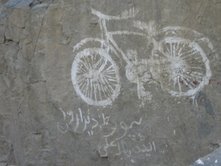
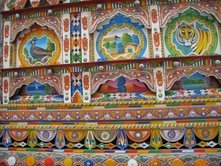
We are still searching for our purpose here in this country. Maybe the value of our time here isn't to collect astounding photos or make lifelong friends. Chris may have nailed it last night when he said that maybe the reason we are here isn't for us at all. Maybe it's for you. So that as your eyes and ears we can tell you what you see here- that this is not a country to fear. That the people are warm and friendly. They are kind towards us. They practice their religions diligently and take seriously hospitality to strangers. People were eager to meet us, and when they learned that we were Americans, they were accepting of us, patient to listen, and understanding of the fact that the citizens are not the government.
Day 15
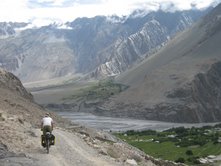
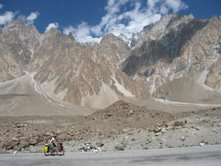
The scenery is compelling. So it's hard to admit I am getting tired of terraced fields on the steep mountainsides with corn, wheat, potatoes and beans, forming tidy geometric patterns on the irrigated alluvial fans streaming wide at the mouths of deep canyons: twenty captivating shades of green leveled against the sandy, tan, grey and brown stones slopes that are the Hindu Kush, the Karakoram, the Himalaya. Farther north, the views are punctuated with the drama of crisp, peaks, all far higher than Mt. McKinley, soaring more than 4 miles up to pierce the sky. Down here,all is dusty, coated with the dryness four rainless months have brought. Only the glaciers still flow, feeding the fields through an ingenious system of high canals, bringing water from the frozen sky to the roots of every plant. It is beautiful. But I am jaded.
There is only so much scenery to see. You adapt quickly, so what is jawdropping and rubber necking, soon becomes a familiar backdrop and you want more. But I think we bit off more than we could chew.
We somehow sidestepped the careful planning that has gone into our trip, and set off with our bikes to cover about three weeks worth of touring in only eight days. We expected to hitch segments of the route- to save time, to pass more quickly through areas we were cautioned against, to avoid riding up the most rocky and steepest sections. But we didn't expect to be hit with such debilitating diarhrea that has taken its toll in forward progress, with time on the bench. So last night, in our flea and bedbug inhabited hotel in the very charming town of Chitral, we had a late planning session. It became clear that our options were three: rush on by vehicle to complete our intended loop through Dir, Swat,and Kohistan; delay our push-off to Tibet by a week, starting around September 20; or enjoy some time at the Kalash Valleys and then return by jeep the way we came. It seems as if the third will be our chosen alternative.
Some of the sections I wouldn't want to repeat, such as where the road is winding and narrow and rocky, scratched right into the rock wall and hanging precariously over the edge of a deep gorge below. I especially don't like when other overloaded jeeps come at us and someone has to back up to allow room for two vehichles to pass. But the latter parts, getting closer to Gilgit, were so beautiful, they returned to my sleeping dreams. Picturesque villages along a bouncy, blue-green river. The essence of summer, with relaxing sandy river beaches and the king of roads with downhill, smooth pavement. If we have to go back, it won't be so bad.
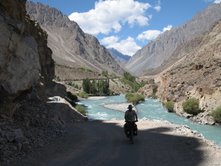
What Are We Doing in Pakistan?
Here it is, 10 days into our time here, and I am feeling apprehension and dissatisfaction. We are riding and hitching a great distance in a short time, making a loop through several of the Northern Areas: Ghizer, Chitral, Dir, Kohistan, Swat, but not having any real contact with locals; riding through emptier places than we expected; and being in much more of a hurry than any other time in these two months. Our purpose here is elusive.
In Kygyzstan, clearly it was about experiencing the environment and everything in it- nomads, sheep, horses, yurts, flowers and the color green; enjoying activities: hiking, mountain biking, horsetrekking; and visiting friends and favorite places. Tajikistan, for us, in contrast to the stony, barren and silent landscape, was about hospitality: tea, lunch, overnighting, weddings, hotsprings - people bringing us into their homes and lives. China was all about riding; transit through empty spaces, from Kyrgyzstan to Pakistan, from Pakistan beyond. And China was about good food. We like eating in the Peoples Republic. But what are we doing in Pakistan?
I am sitting in the morning tent in Shandur Pass, site of the world's highest polo grounds, all but deserted in this early fall season, save the few soldiers in the barracks behind the small mounds to our east, and the yaks grazing nearby to the west. Chris is trying to cook our corn mush and date breakfast on the last of the bad Tajik fuel which we bought from a five gallon bucket in Murgab. I am typing away, trying to make sense of my time here in Pakistan.
We entered the country with some difficulty. The Chinese bus we boarded in Kashgar, we expected to get off of at top of Kunjerab Pass to ride the 86 downhill kilometers to the border town of Sust. But the Chinese driver refused to let us out. He claimed that about a month ago he had let two other foreign cyclists off at the pass so they could ride down. When he arrived in Sust without them, he was made to go back and retrieve them. I doubted his story. When we arrived at Immigration, I lodged a complaint against him. He was brought in to the chief and told that he should have let us out. It helped that it was a misty, drizzly day with poor visibility and a slick, broken road. But it was already done.
We had already arrived in a town of men. Only traders, hoteliers, cooks, shopkeepers, barbers and chicken-killers - there are fresh birds everywhere to be bought, feathered or plucked - were to be seen on the streets where we spent our first night in Pakistan. All dressed in the baggy pajama-style shalwar kamiz, which is local dress for men; Chitrali hats, wool caps with a rolled brim; and facial hair consisting at a minimum, of a moustache.
I'm wondering. Originally the plan was to take two weeks riding on the Karakoram Highway (KKH), stopping off at the great places along the way in the Northern Areas, ending down in the the town of Gilgit, as I had done nine years before. We moved quickly, and had five great, scenery-filled days of high activity and elevated moods by the time we reached there.
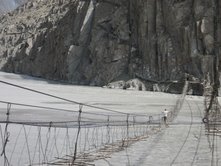
On the third day in country, Chris got the chance to cross one of the famous and freaky suspension bridges near Passu. I couldn't bring myself to do it again, and was content to play photographer. Early that evening we arrived in Karimabad, the tourist capital of Hunza, where we met Mercedes and Enrique, Spanish-speaking cyclists into their fifth month on the road. We relaxed there, did some tourist shopping, paid too much for dried apricots and would have paid too much for walnut cake and Hunza museli too, if the power hadn't been out for the past two days.
The next day, we had a late afternoon ride through winding village roads, through the frenetic strip of business that was AliAbad, to the pleasant village of Minapin. The hotel at the top of the hill hadn't changed much: the apple trees were thicker and there was a new high-end wing on the hotel. There was a new proprietor, although the previous one was around, and we remembered each other and the tea and chips (thick cut fries) were as good as ever. Only the welcome had changed. Four kilometers back, begining at the turnoff to the village, was a barrage of signs on walls, stones, buildings, bridges. Down With The USA. Kill Bush. Crush Israel. It seems recent events in Lebanon had provoked this outcry. This did not reflect our experience anywhere else, as we were often greeted by children giving us pears, teenagers grapes, men apricots, grandmothers apples, to welcome us to the country. Likewise, some group is responsible for painting other signs on stones: Love Nature, Educate Your Children. Peace is Wealth. Help the Tourist.
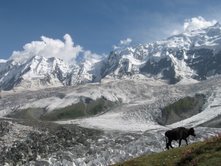
We had our best day so far, trekking 4000 feet to the Rakaposhi Base Camp. I had hiked to this 12,000 foot lookout before, but it had been snowing, so when I got to the viewpoint I saw only the sharp jagged teeth of the glacier below. This time, we emerged on the ridgetop in full afternoon sun to a rising wall of snow and ice full in our view. We giggled and laughed at the crisp blue sky and clean white faces rising another 12,000 feet above us to their 7740 meter heights.On the fifth day, we struggled in the heat and arrived in the hectic, crowded, trafficky city of Gilgit, just at the close of dusk, after 92 mostly smooth, uphill and downhill kilometers. The Madina Hotel was a welcome garden haven in the midst of the madness. The owner Yakoov, is a gentle, practicing Ismaili Muslim man. His ethics and demeanor were inspirational. An added joy was the reunion with Karim, a local man still affiliated with the hotel that I had kept in touch with sporadically since we first met in 1997. He was able to bring deep insight into the local culture and politics.So, five great days in Pakistan. And then what? Armed with Mercedes’ suggestions and trip notes, we decided to spend the next 10 days on this counter-clockwise loop, exploring some new and reportedly friendly regions in the North West Frontier Province. Two days into it, why am I so unhappy?
"I don't want to do this anymore," I cried, curled up on the the ground, sucking warmth from the dirt, hiding from the wind behind a big rock, hiding from the reality that I was somewhere in northern Pakistan and just wanted to be done with all this. Sobbing, I was really wondering why I thought I could do this bike trip in the first place, and how I was going to get out of cycling across Tibet. "It's too hard. I have no energy. I'm too lazy. I can't do this."
"It's OK to have a bad day," Chris soothed. "You can cry if it makes you feel better." Chris brought me a drink and the crumbly yellow pad to rest on. He was treating me so kindly, despite my ineptness, I felt even worse: weak, lazy and undeserving . I had really wanted to make the 48 kilometers to the top of Shandur Pass. We'd only gone half the distance but I knew that I was finished. All I wanted to do was lay down with the last pages of the novel I'd finally cracked and read until sleeping at the early failure of light, now around 7pm. Just then a vehicle came by.It would have been one thing if I were really sick. Raging fever. Vomiting. Then I could easily justify getting off the bike and into a Landrover. Sure, my stomach was queasy and noisy and caused me little appetite resulting in poor nutrition and lack of fuel. Too, I had a bit of a tickle in my throat and too much mucus in my lungs. The dramatic drop in barometric pressure, replacing blazing sun with clouds and coolness, and maybe a bit of hormonal deficiency- I guess these things were all contibutors as well as maybe road fatigue. A bit of apprehension travelling to slightly questionable areas. Maybe a sense of disingenuousness at travelling so far and cycling so little. to my lassitude. But I couln't excuse myself for my poor performance.
The driver took us to the top of the pass, site of the world's highest polo grounds. Mercedes raved about the place, saying you could spend days there just relaxing. We found it a bit bleak and uninviting even though there were tall mountains and it was very quiet. We later learned that early July is the green season when the place was crawling with national tourists. We got the tent up in the cold wind, and Chris prepared a macaroni soup with the last of our Kyrgyz dried tomatoes. We had mistakenly left most of our food in China when we set off for this brief Pakistani holiday, so we had very little of interest to eat. But we had arrived at our resting place for the night, Shandur Pass, where I retired early with The Life of Pi. Catastrophe averted, and we are on track again.
Reversal
It was a delightful and rewarding descent from the top of the pass into the village of Laspur. Not for the first time I was glad that I have a mountain biking background, as it was actually a somewhat technical descent. In fact, we met a medical French couple in the Kalash valley, several months into their two and a half year world bike tour, and Chloe remarked that it was a very difficult ride down for her. We thought it was great fun. Well, maybe Chris wasn't so thrilled after he realized that the thunk he'd heard was his water bottle flying out of its cage, and he had to run back uphill retrieve it.As we contined along the rock strewn, dusty road, there was a sudden reversal of fate as Chris sought rapid relief, at first behind the cover of large boulders, and eventually just anywhere off the bike. Our progress slowed as we neared the village of Mastuj, happy to rest early in the Merecdes recommended hotel. What she failed to indicate was the four kilometer climb to the village proper, up a steep, loose gravel bed, and up some steep, sandy sections. During the next 24 hours, Chris managed to find relief a total of 30 times. I guess that qualified as severe diarrhea, warranting a course of Ciproflaxcin.
It also warranted an unscheduled layover, the bright side being that our hotel proprietor invited us to join him at a neighbor's son's wedding the next afternoon.
It's hard to understand, but as in Tajikistan we were treated as special guests. Festivities were already underway when we arrived to the big tent in the neighbors' yard. We were ushered across the central clearing, stepping through the ring of men and boys, five deep on the perimeter, and given three of the very scarce chairs to sit on, which were vacated by less worthy souls. In the center, in turn, small boys and then grown men danced- solo, or just a few at a time, while the males forming the ring clapped to the rhythms of the paid musicians. Where, you may ask, were the women ? Well, some of the girls were peering over the back of the courtyard wall, close to the home where they were relegated. But for the most part, all the females were crowded into the house and courtyard, away from the men, away from the music, away from the central celebration.
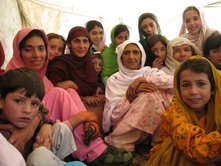
We witnessed this because when they saw our cameras, the hosts asked us to come to the house and photgraph the bride and groom. I was glad to be able to interact with the grandmas and the girls. But I was baffled at the men's idea of a good time. At least in Tajikistan, the men got to dance with the women, and the women got to show off their finest for the men. This day was the beginning of dismay for me at the intensely patriarchal society that prevails in much of the area we visited.
Our stay at the wedding was relatively brief, as the dancing ended and heaping plates of pilu (rice pilaf with mutton and carrot) were served. They specially placed us at a table with chairs, and even brought us spoons, as food is traditionally eaten with washed hands. Just as fast as they were fed, everyone filed out or the yard, to return in the evening for the real party. We opted for a decent night's sleep so we could be on our way in the morning.
By jeep. The next day we were in Chitral. By the time we had been to the Kalash and back, we were ready to head back to Gilgit. It was joyous to cycle again along the Ghizer River. Gemstone aquamarine blue green water under the cacaphonously clashing azure heavens. Armies of school girls bouncing home in their sky blue or turquoise green shawls, separate from the troops of boys in their gay blue, button down collar shirts.
"How are you? We are fine. What is your name?" Shy giggles and smiles and a bold girl daring to speak English out loud to the foreigners. The same in every village. The same passing each of the many schools.
The Kalash
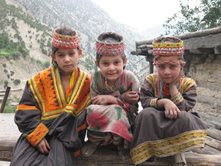
If you've heard of them, you know thatthey are some Other People living in a remote valley in northwestern Paskistan. The women wear black cotton dresses, heavily embroidered at the shoulders and hem, and tied with a broad, bright, handwoven belts of hot pink or bright orange color. Their necks are draped with 50 or more strands of yellow and orange bead strings. A top their heads are a too-small beaded crown with varieties of metals bells, plastic buttons and white seashells added to make intricate patterns with strong, bright beads. An 8-inch wide tail trails down from the center of this crown, three more pounds of trinkets beaded into a continuation of the headband. These head pieces are balanced on theskull, resulting in excellent posture among these girls and women. They are trained to wear them beginning around the age of three. Their bangs are long and combed forward, and then braided into three different width plaits right at the front crown. These long tails are then turned and pulled back behind the head to trail below their headdresses. The rest of their hair is cut very short.
Begining at seven years old, girls get their first tattoos- simple stars, circles, crosses and dots - on the forehead, the left cheek, the chin, the right. They marry young and live with their families in slate and log houses- rectangular, dark, and seemingly suspended among the cliffs.
They are farmers, growing grain and beans and vegetables. The are arborists with walnut, pear,apple and other stone fruit fruits. And they are enologists, making wine.
An enclave in a Muslim land, they have their own culture and society. They are friendly and welcoming to strangers. And in the warm months they receive many. Not only foreign tourists make the journey out to this distant valley, but local Pakistani tourists come out, especially young Muslim men. For where else can they drink their fill freely of wine when they live in the dry province of the Northwest Frontier?
We got a ride back to Chitral town with one such carload of 2nd year engineering students from a village four hours away. One seemed comatose in the front, another riddled with head pains in the back. They insisted the driver was sober, but an hour into the ride I was eager to change vehicles, so when the students stopped for a short break, I flagged down another car and we quickly piled in to a gasoline fume saturated jalopy. Out of the frying pan and into the fire.
We had had an overnight stay in the valley of the Kalash. Not enough time to get to know the people or their animist religion, but enough time to take pictures, teach a girl to juggle, and teach an 8th grade class about my home state and its animals. After the vocabulary-geography-art lesson was over and we opened it up for questions, there was just one. A confident boy in the back asked, Why is America so harsh towards Muslims?"


0 Comments:
Post a Comment
<< Home